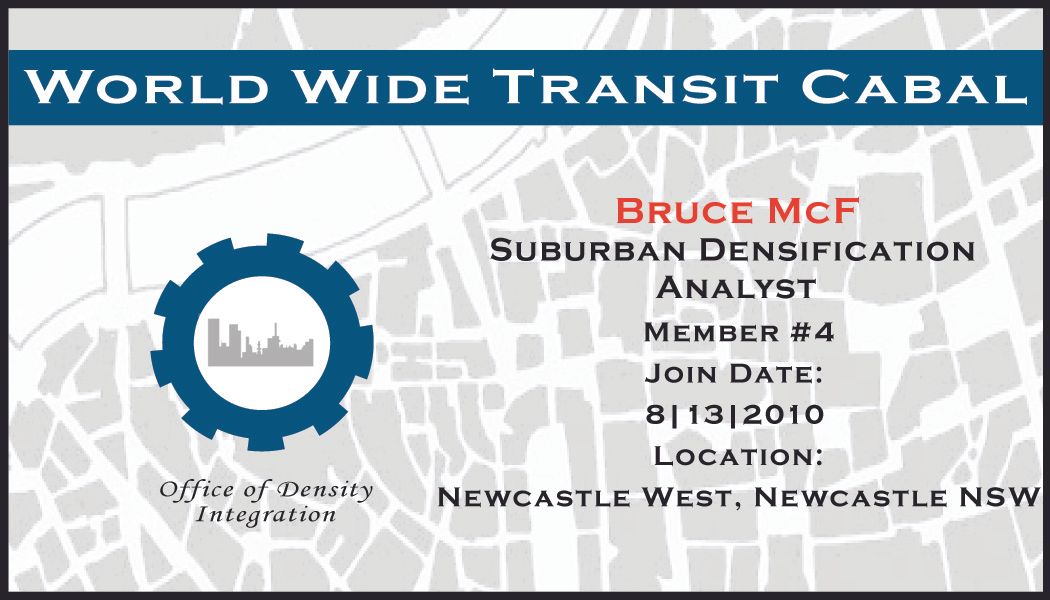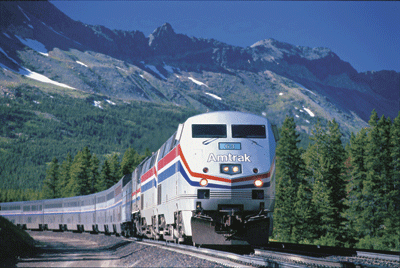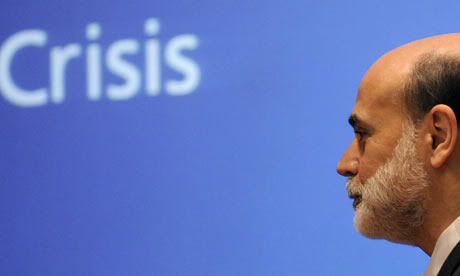Author's posts
Jul 08 2013
Sunday Train: Sidestepping the Koch Brothers’ Climate Suicide Pact
cross-posted from Voices on the Square
 Grist this last week covered an often overlooked element of climate suicide policy of those famed climate kamikaze’s the Koch Brothers:
Grist this last week covered an often overlooked element of climate suicide policy of those famed climate kamikaze’s the Koch Brothers:
Since 2008, the Koch-backed group Americans for Prosperity has been urging candidates and politicians to sign its “No Climate Tax Pledge.” In 2010, we noted that many Republican House and Senate candidates had signed it, and in 2011, that at least one GOP presidential candidate had.
But it turns out the pledge has been far more widespread and influential than most people realized. From the Investigative Reporting Workshop:
A quarter of senators and more than one-third of representatives have signed a little-known pledge – backed by the Kochs – not to spend any money to fight climate change without an equivalent amount of tax cuts….
Jul 01 2013
Sunday Train: Sustainable Real Estate Development is Good for the Economy and Other Growing Things
cross-posted from Voices on the Square
 As a member of the WorldWide Transit Cabal (not to be confused with the Secret Worldwide Transit Cabal, since of course their membership is secret, though at times my blogging is as active as there’s), I have long argued that development of sustainable transport will be good for the economy as well as other growing things (to paraphrase the National Lampoon).
As a member of the WorldWide Transit Cabal (not to be confused with the Secret Worldwide Transit Cabal, since of course their membership is secret, though at times my blogging is as active as there’s), I have long argued that development of sustainable transport will be good for the economy as well as other growing things (to paraphrase the National Lampoon).
Recently, a study by Professor Gary Pivo has been released that demonstrates that this is not just a forward looking statement. Sustainable Transit-Oriented Development is presently good for home values and are associated with lower risk of foreclosure. How good? To quote Ped Shed’s summary of the research results:
The second hypothesis was that default risk was reduced by sustainability features (or conversely, risk was increased by unsustainable features). This also turned out to be true. The effect of the variables was substantial:
- Commute time: Every 10-minute increase in average commute time increased the risk of default by 45%.
- Rail commute: Where at least 30% of the residents took a subway or elevated train to work, the risk of default decreased by 64.4%. New York City was omitted from this calculation because it skewed the results.
- Walk commute: Every increase of 5 percentage points in the percent of residents who walk to work decreased the risk of default by 15%.
- Retail presence: Where there were at least 16 retail establishments nearby, the risk of default decreased by 34.4%.
- Affordability: For properties with some units required to be affordable, the risk of default decreased by 61.9%.
- Freeway presence: Where properties were located within 1,000 feet of a freeway, the risk of default increased by 59%.
- Park presence: Where properties were located within 1 mile of a protected area, the risk of default decreased by 32.5%.
And this does not seem to be just “fishing for results”: adding these factors to a model used by other researchers, including “characteristics of the loan, property, neighborhood and location, and regional and national economies” improved the accuracy of the model on four measures of goodness of fit.
Jun 24 2013
Sunday Train: Steel Interstates and Using the Defense Budget to Improve National Security
 This is the year that the funding authorization for the Federal Rail Authority expires, and the Obama administration is answering with a bold new plan to invest in this critical piece of any long term sustainable transport system, as described earlier this month at the Transport Polititic:
This is the year that the funding authorization for the Federal Rail Authority expires, and the Obama administration is answering with a bold new plan to invest in this critical piece of any long term sustainable transport system, as described earlier this month at the Transport Polititic:
Total funding for rail activity, both for operating funds and capital projects, would increase from about $1.8 billion in 2013 to more than $6.5 billion in fiscal year 2014. Over the course of five years, about $40 billion would be devoted to rail improvement across the country, a massive expansion paid for with funds “saved” from ending military operations overseas. This would be headlined by a $5 billion “jump-start” stimulus for rail, part of a $50 billion infrastructure package the Administration is hoping Congress will pay attention to.
Jun 17 2013
Sunday Train: 2013 ~ the Year of American Bikeshare
 New York City gave me Bikeshare for my birthday (June 2):
New York City gave me Bikeshare for my birthday (June 2):
Citi Bike officially launched to annual members on Monday, May 27. As of 5 p.m., members had made more than 6,000 bike trips, and traveled over 13,000 miles – greater than half the Earth’s circumference! Visit Citi Bike’s blog for more stats, facts and tips.
Membership opens to daily and weekly users on June 2.
Well, it opened to people taking out an annual membership on May 27, but I don’t live anywhere near New York, so if I get to use it, it will be as a “daily or weekly” user.
Jun 10 2013
Sunday Train: All Aboard for the Cross Illinois Line
 While browsing the Midwest HSR Association site recently, I came across this story:
While browsing the Midwest HSR Association site recently, I came across this story:
Midwest High Speed Rail Association Lauds Rep. Moffit’s Proposal for New Midwestern Amtrak Link
CHICAGO (May 23, 2013) — Midwest High Speed Rail Association Executive Director Richard Harnish released the following statement Thursday in response to Illinois State Rep. Donald Moffitt’s (74th District) proposal of a new bill proposing a study leading to the creation of a new east-west Amtrak line in Illinois:
“Rep. Moffitt has identified a missing link in our state’s mass transportation system.
“The addition of a new Amtrak route linking population and commercial centers would be a major enhancement of our rail system, and a stepping-stone to further expansion and improvement of the system.
“Today, if you need to travel between Chicago and Springfield, Galesburg, Peoria, Normal and Urbana-Champaign or over to the Quad Cities, you are most likely to drive.
… “This addition and the public’s utilization of it will help to lay the solid foundation for future modernization–especially for the full implementation of high-speed rail between Chicago and St. Louis and other major midwest destinations.
Jun 03 2013
Ebooks need to re-invent Pulp!
 Ebooks have revolutionized the publishing revolution and YOU TOO can be part of the Revolution!
Ebooks have revolutionized the publishing revolution and YOU TOO can be part of the Revolution!
In Burning the Page, digital pioneer Jason Merkoski charts the ebook revolution’s striking impact on the ways in which we create, discover, and share ideas. From the sleek halls of Silicon Valley to the jungles of Southeast Asia, Merkoski explores how ebooks came to be and predicts innovative and interactive ways digital content will shape our lives. Throughout, you are invited to continue the conversation online and help shape this exciting new world of “Reading 2.0.”
It seems as if one way to make money with ebooks is to first make money with ebooks and then write an ebook about how to make money with ebooks.
Tobias Buckell, Science Fiction author with work first published in both tradtional and new ebook market makes a cautionary point about these kinds of works:
Survivorship bias: why 90% of the advice about writing is bullshit right now …
The problem, right now, in eBook direct sales, is that everyone is paying and listening to people in the green area. They’re listening to everything they say, and sifting everything they say as if it’s a formula for success.Like in most cultish behavior, if you follow the rules and don’t get the results, you’re either ostracized, ignored, or it’s pretended you don’t exist. Many who don’t get the same results just shut up and go away. Thus creating an environment where people are creating massive amounts of confirmation bias by continually listening to the top sellers.
(BTW: Read the whole piece, its good stuff, and survivorship bias is a useful critical thinking tool in a wide range of areas, including policy campaigns.)
May 28 2013
Experiments in a new media economy
 The economy that we know is always the economy we used to have. To find out what economy we have and where our economy is heading, we have to look at the tension between technological change in the setting of past-bound rules of the road.
The economy that we know is always the economy we used to have. To find out what economy we have and where our economy is heading, we have to look at the tension between technological change in the setting of past-bound rules of the road.
I have been looking at the niche industry of Anime as a kind of petri-dish for changes in the media economy. In the present essay, I am looking at two particular crowd-funding ventures for overcoming hurdles faced by two different types of productions. However, to explain why I find these ventures interesting, first I take a bit of a look at the evolution of the current status quo, and why they are ventures of more general interest in the evolution of our next economy.
Nov 26 2012
Economic Populist: CBO, on the public dime, peddles BS to the public.
Burning the Midnight Oil for Economic Populism
 crossposted from Voices on the Square
crossposted from Voices on the Square
Yves Smith at the excellent and insightful Naked Capitalism has recently been taking at a close look at the role of the Congressional Budget Office, the vaunted "CBO", in the "fiscal cliff" scam that the corporate aristocracy is attempting to perpetrate on us mere commoners.
On 4 November, 2012, in Fed Budgetary Experts Demolish CBO Health Cost Model, the Lynchpin of Budget Hysteria, Yves looked at how the CBO put its thumb on the scale to exaggerate the magnitude of the fiscal challenge that we face (as I noted just recently, while there is a challenge, there is certainly nothing of the magnitude or urgency to justify treating like a crisis). Yves does this by drawing on the analysis of analysts at the Fed that highlight the questionable and, in at least one case, clearly flawed, assumptions made by the CBO in their modelling. On 14 November, 2012, in The CBO’s Latest Con Job: Disappearing Data to Deter Analysis of its Deficit Scaremongering, Yves looks at how the CBO fudges the numbers, omitting figures it once included in the fine print of CBO analyses … after it has been pointed out that taking those figures into account, the CBO modelling implies debt staying below 80% of GDP through 2020, rather than rising to about 90% of GDP in 2022 as the CBO has been claiming.
However, those two are a bit "wonky", to use a term beloved of the recently losing VP nominee. They bookend a post in which Yves Smith points out the suspect behavior of the CBO in terms that are a bit less "wonky". And that is what I am taking a look at myself, in this essay.
Nov 17 2012
Economic Populist: Capping Bush Tax Cuts fixes over half of fiscal problem
Burning the Midnight Oil for Economic Populism
Crossposted from Voices on the Square
Among the many things entirely lost in the mainstream media coverage of the “fiscal cliff” are the nature and magnitude of the country’s fiscal challenge. The magnitude is why it is not a crisis, and the nature is why we would be better off “just doing nothing” ~ letting the whole Bush tax cuts expire and scrapping the zombie spending cuts ~ is better than the vast majority of “fixes” floating around in the mainstream media.
Nov 08 2012
Arc of the Sun: Does the US Need More Ships and a Bigger Naval Budget?
Burning the Midnight Oil for the Arc of the Sun
Crossposted from: Voices on the Square
 Way back in the third Presidential debate (that was pre-Sandy), the challenger said:
Way back in the third Presidential debate (that was pre-Sandy), the challenger said:
Our Navy is older – excuse me – our Navy is smaller now than any time since 1917. The Navy said they needed 313 ships to carry out their mission. We’re now down to 285. We’re headed down to the – to the low 200s if we go through with sequestration. That’s unacceptable to me. I want to make sure that we have the ships that are required by our Navy.
So, how many ships does the Navy need?
On his website, the challenger says:
This will not be a cost-free process. We cannot rebuild our military strength without paying for it. Mitt Romney will begin by reversing Obama-era defense cuts and return to the budget baseline established by Secretary Robert Gates in 2010, with the goal of setting core defense spending-meaning funds devoted to the fundamental military components of personnel, operations and maintenance, procurement, and research and development-at a floor of 4 percent of GDP.
So, do we need to boost the Naval Budget?

Recent Comments